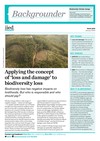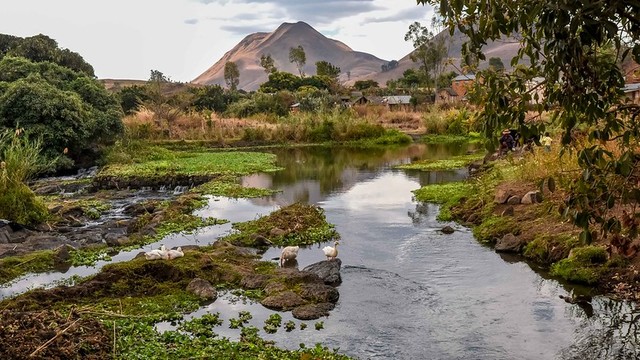Addressing nature loss and damage due to climate and consumption
The UN’s climate change loss and damage fund will look at damage to biodiversity. But most damage to nature is caused by habitat loss and degradation driven by unsustainable consumption in the global North. This project will explore how to address loss and damage to nature due to climate change and unsustainable consumption.

Pineapple production in Cameroon (Photo: Ollivier Girard/CIFOR via Flickr, CC BY-NC-ND 2.0)
In 2023, the UN climate change process agreed to set up a new loss and damage fund to help developing countries cope with the impacts of climate change.
The new fund will address both economic and non-economic impacts associated with climate change. This should include the loss and damage of biodiversity and ecosystems.
The impacts of climate change include changes in rainfall patterns and increased temperatures, which can negatively impact biodiversity and ecosystems. The increased severity and frequency of storms, flooding, wildfires and droughts linked to climate change can also contribute to the damage and disruption of ecosystems. Developing countries have contributed least to this climate crisis but are facing its worst impacts.
Despite the serious impacts of climate change on ecosystems and biodiversity, the main drivers of biodiversity loss and ecosystem damage across the global South are land conversion and over-exploitation for agriculture, spurred on by unsustainable consumption in the global North.
Whether driven by climate change or over-consumption, the main burden of loss and damage to nature is borne by people living in the global South - the loss of livelihood, cultural heritage, resources or identity.
The UN climate change loss and damage fund must adequately address biodiversity loss and damage caused by climate change. However, there is also a clear need to consider additional mechanisms to address the losses and damage to nature in developing countries driven by unsustainable consumption in the global North. Currently, there is no mechanism that acknowledges and addresses this injustice.
This project will bring together a wide range of stakeholders to examine how to effectively address loss and damage to nature, both from climate change and from unsustainable consumption patterns.
Objectives
This work stream will address the issue of nature in the context of discussions about loss and damage, both within the UN climate change process and on a wider scale, building on the concept of "the consumer pays" principle.
It will explore and potentially reframe the current parameters of the climate justice movement, encouraging thinking that goes beyond the issue of reducing fossil fuel emissions to examine all the causes of biodiversity loss and the associated injustices.
What will IIED do?
We will review existing literature and narratives on this topic and engage with a wide range of stakeholders closely linked to loss and damage and biodiversity conservation.
We will work with partners to organise and host online events to bring key stakeholders together to discuss narratives, perspectives, opinions and experiences related to the loss of biodiversity and damage to ecosystems, exploring not only how existing or new funding mechanisms can operate to effectively address this loss and damage, but also the solutions that might be best-placed to address it.
We will develop practical recommendations for tackling the loss and damage of nature and will publish and promote our findings via a range of publications such as animations, blogs, dialogue reports and policy briefings.



